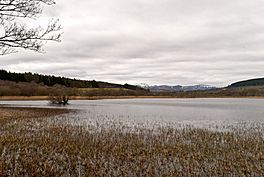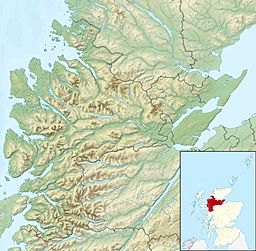Loch Achnacloich facts for kids
Quick facts for kids Loch Achnacloich |
|
|---|---|

Shore of Loch Achnacloich on a dull day
|
|
| Coordinates | 57°43′57″N 4°14′37″W / 57.732400°N 4.243600°W |
| Type | freshwater loch |
| Max. length | 0.42 km (0.26 mi) |
| Max. width | 0.18 km (0.11 mi) |
| Surface area | 7 ha (17 acres) |
| Average depth | 14.1076 ft (4.3000 m) |
| Water volume | 10,172,319.1 cu ft (288,048.00 m3) |
| Shore length1 | 1 km (0.62 mi) |
| Surface elevation | 117 m (384 ft) |
| 1 Shore length is not a well-defined measure. | |
Loch Achnacloich is a beautiful, shallow loch (which is the Scottish word for lake) located about 4 km (2.5 mi) north of Alness in the Scottish Highlands, Scotland. It's found in an area called Ross and Cromarty.
Contents
Exploring Loch Achnacloich
Loch Achnacloich is known for its stunning natural beauty. It sits in a peaceful valley surrounded by rich woodlands. The trees grow thickly on both the northern and southern sides of the loch.
Rivers and Streams
A stream called the Burn of Achnacloich flows into the western side of the loch. On the eastern side, the water flows out as the Inchindown Burn. This burn changes its name again to the Kinrive Burn before joining the Balnagown River.
Surrounding Hills
The highest point near the loch is a hill called Cnoc Corr Guinie. It stands at about 396 m (1,299 ft) (or 1,299 ft (396 m)) to the north. This hill offers great views overlooking the loch and the surrounding area.
A Special Place for Nature
Loch Achnacloich is recognized as a Special Area of Conservation (SAC). This means it's a very important place for wildlife and plants in Europe. It helps protect some of the rarest and most threatened habitats and species.
Amazing Plant Life
The loch is a great example of a lake with many different kinds of water plants. You can find a wide variety of plants, especially on its southern and western shores. Many of these plants are more common in warmer, southern parts of the UK.
Rare and Unique Species
Loch Achnacloich is home to six different types of pondweed (from the Potamogeton family). It also supports the nationally rare least water-lily (Nuphar pumila). This lily is quite special because it's not found in many other places in the country. The loch's rich plant life shows that it has a high biological productivity. This means it's very good at supporting a lot of living things.
 | John T. Biggers |
 | Thomas Blackshear |
 | Mark Bradford |
 | Beverly Buchanan |


